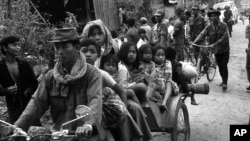Sokhon Uy was sent to Battambang during the Khmer Rouge-ordered evacuation of Phnom Penh in 1975, a few days after she gave birth to her youngest daughter.
“Nobody knew what was going on; we were required to leave the city and were supposed to return home just three days later, but it turned out not to be true,” she said in a recent interview, wiping away tears as she recalled the traumatic events on that Spring.
She lowered her voice.
“I am saddened that Cambodia has lost so many people – we used to have lots of scholars. It’s such a great loss. I want to urge the young generation to learn and remember this tragedy, so history can never be repeated.”
Both of Uy’s children and her husband were killed during Pol Pot’s rule.
Between 2011 and 2014, the Khmer Rouge tribunal sponsored radio programs aimed at spreading awareness o the trauma inflicted on the generation that lived through these years of hardship by offering on-air counseling to survivors.
Now, with the support of the UN Trust Fund to End Violence Against Women, the radio shows are set to relaunch, this time with a focus on women living under the regime, and the impact of sexual and gender-based violence, both historical and contemporary.
The programs launched on Monday.
Sarath Youm, the project manager with the Transcultural Psychosocial Organization, said the shows would feature guest speakers including legal experts, civil society members, psychologists, as well as women who have survived gender-based violence.
“This radio program is such an important platform for providing opportunities to victims to express their problems and experiences that happened during the Khmer Rouge regime,” he said.
“I encourage the victims to have the courage to join us and let their stories be heard.”
Under Pol Pot’s Khmer Rouge regime, millions of Cambodians were ordered out of the cities to work in the countryside and isolated from the world. Private property, currency and religion were abolished in place of rural collectives organized by the party.
Suphany Oum, author of Under the Drops of Falling Rain, a fictionalized memoir based on her diaries, said that during the evacuation of Phnom Penh “the most unforgettable, miserable memories I cannot dismiss from my mind were the excessive forced labor, executions and starvation.”







